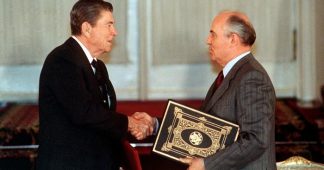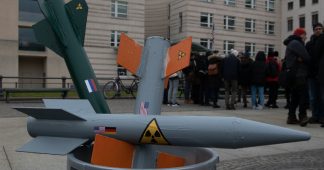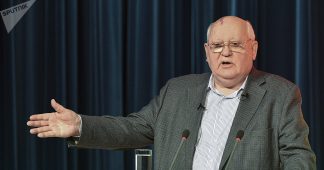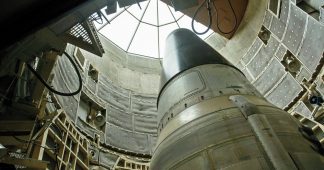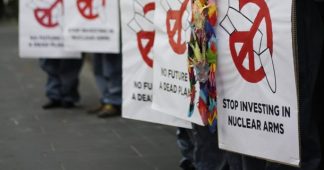February 21, 2019
It’s almost ten years since President Obama made his famous Prague speech, committing to a nuclear weapons-free world. I remember hearing his words broadcast, amid the tumultuous cheers of the crowd in Hradčany Square, as if it were yesterday. I stood with peace activists in glorious spring sunshine outside the No to NATO counter summit in Strasbourg and our speculations ran riot. US nukes out of Europe? An end to Trident as part of a global disarmament deal? What heady days those were, what days of hope.
Then as President Medvedev of Russia added his voice to the call, hopes were high that real progress would be made towards that goal. Those were truly inspiring moments, and although over the year that followed, there were times when I felt hope was receding, finally words were turned into actions. The new START Treaty was signed, which made significant reductions to US and Russian nuclear weapons, limiting their deployed strategic nuclear warheads to a combined total of 1,550. It wasn’t everything we wanted, but it was a step in the right direction.
How far away those days seem now. It’s not just that moves towards arms reduction and disarmament have stalled – they have actually gone into reverse. Since Trump entered the White House, there have been sustained attacks on the treaty architecture that underpins the rules-based system that most countries struggle to uphold and extend. The whole principle of multilateralism has faced successive onslaughts, and with John Bolton at Trump’s right hand as National Security Adviser, non-proliferation and disarmament treaties are not long for this world.
The Trump administration is doing its very best to destroy the 2015 Iran nuclear deal, whilst also banging the drums of war. Its withdrawal and attempts to reintroduce sanctions on Iran can only lead to greater instability in the Middle East and increase the likelihood of more countries in the region pursuing nuclear weapons. This move by Trump is not a popular one: all the other signatories to the deal are trying to uphold it – including Britain – but it’s not clear how long this will be sustainable.
And now President Trump has announced that the US will withdraw from the 1987 Intermediate-range Nuclear Force (INF) Treaty with Russia. Russia has since done the same. This treaty has been a cornerstone of nuclear arms control since the Cold War, having eliminated thousands of nuclear missiles in Europe, playing a crucial role in ensuring that US missiles are not situated on our continent. There are many possible dangers as a result of its cancellation: a new nuclear arms race, US missiles back in Europe – and that includes Britain – trained on Russia, US missiles in Okinawa trained on China, nuclear war.
As if it can’t get much worse, US withdrawal from the INF treaty also calls into question whether Washington will work with Moscow to renew Obama and Medvedev’s New START treaty in 2021, when it is due to expire. If Bolton has his way, once the Treaty expires there will be no restraints on nuclear weapons left. A grim prospect indeed.
* Kate Hudson has been General Secretary of CND since September 2010. Prior to this she served as the organisation’s Chair from 2003. She is a leading anti-nuclear and anti-war campaigner nationally and internationally.
Published at https://cnduk.org/ending-all-nuclear-restraints/

